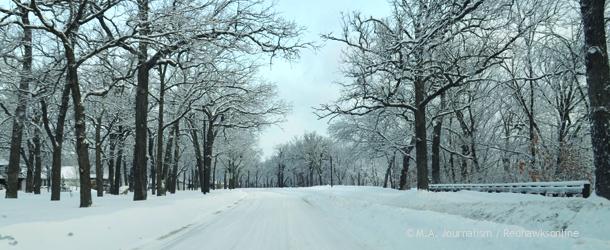While public school systems in the Twin Cities have a set of specific conditions which spur the decision to close schools, Minnehaha’s decision-making process is more complicated
Last winter was one of the longest and coldest Minnesota has seen in years. The fact that the winter was so cold caused a scramble across Minnesota on many days in January and February. To address these issues and attempt to put in a more solid and dependable system, many school districts across the state have held meetings to either take another look at existing policies for announcing snow days, or to implement them altogether, had they not previously been in use.
The Saint Paul Public Schools (SPPS) met over the spring and summer to draft a document addressing the problem, entitled “Winter Weather Plan 2014-15.” In the document, they say – in a manner congruent with other similar documents – that, “The safety and well-being of students and staff is our top priority and the decision to close school is no simple matter.”
They have specific numbers in place as thresholds for when to close school. SPPS will make an announcement before 6:30 p.m. if the forecast for 6 a.m. the next day shows a wind chill of -40°F or less, or an air temperature of -25°F or less. They do not, however, have specific numbers in place for snow days.
It’s not an easy job, being part of the group to help decide whether to cancel school on a certain day. SPPS monitors (at least publicly) the National Weather Service forecast. “School will be canceled if heavy snow and/or icy conditions make it extremely hazardous or impossible for school buses to travel their routes and for employees to get to work safely,” it says on their website.
The document goes on to mention a reason that this system is especially necessary. For SPPS, delayed start times for classes on a given day are not logistically possible, because of a variety of reasons, one being complications with buses.
There are other schools implementing school-closing codes besides SPPS, including the Minneapolis Public Schools (MPS). MPS has similar guidelines in place, but unlike SPPS’ definite cutoffs, these are just guidelines. “We consider closing school,” their website says, “when wind chill is at -35°F or colder at 6:30 a.m.”
Another way MPS’ policy differs from that of SPPS is that they have set values in place for snow as well as temperature. Again, these are just guidelines, but MPS says they will consider closing school if more than 6 inches of snow falls in 12 hours, or if more than 8 inches of snow falls in 24 hours.
Minnehaha Academy has actually had a system, for many years, to help determine when snow days should be called. This system is decided on by a group of faculty including Director of Athletics and Facility Operations, Homar Ramirez, “We have had a process in place since I got here,” said Ramirez.
It is important to note, at this point, while SPPS and MPS have solid numbers and cutoffs to decide when to close school, Minnehaha does not. This is partially due to the fact that these school districts have students that live inside of a definite boundary that is fairly small compared with Minnehaha’s. Because Minnehaha has students from all over, school-canceling-worthy conditions could be experienced by a number of students, with students on the other side of the Twin Cities experiencing nothing.
“St. Paul Public Schools, last year, got into a situation when the governor canceled school on Day One,” he said, “And the next day, it was actually colder, but they didn’t cancel school. So that creates a lot of unnecessary situations.”
“If we are concerned about weather impacting our school day, we all stay focused on the weather,” said Ramirez. “And we are getting it from multiple sources, we’re not relying just on David Dahl.” David Dahl is the evening chief meteorologist for 5 Eyewitness News. “We are looking at the National Weather Service, as well as local [outlets].”
“I am up, typically, at four in the morning to evaluate that situation,” said Ramirez, “as are my outdoor maintenance guys, as well as our transportation director.” Those three parties are in communication by 4:30 A.M. at the latest to decide what the best course of action is for a particular situation.
Ramirez continued, “Step one: if we can’t get into the building, we can’t have school. That’s why the outdoor maintenance guys are extremely important. Step two is the transportation: if we can’t get the students here, that’s a negative factor.” Minnehaha’s president, Donna Harris, is brought in to help in the decision-making process, as well, along with the principals of both schools and other members of the faculty.
“And that’s where SchoolMessenger will really help us,” said Ramirez. SchoolMessenger is Minnehaha’s new emergency notification system with which the school’s administration can send out messages through voice mail, email or text to parents, informing them of updates.
If you are looking for a guide or set of parameters for when school is likely to be closed due to weather, visit the website, www.minnehahaacademy.net. Under the “Quicklinks” tab on the HomePage, there is a link labeled “Weather Related Communications”. You can visit that link for any questions you have on Minnehaha’s closings and SchoolMessenger.

